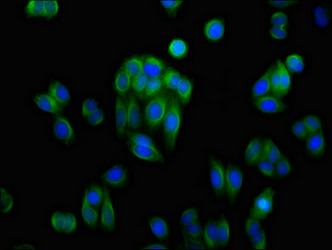Full Product Name
Rabbit anti-Homo sapiens (Human) AKR1C1 Polyclonal antibody
Alternative Names
2-dihydrobenzene-1 antibody; 2-diol dehydrogenase antibody; 20 alpha (3 alpha) hydroxysteroid dehydrogenase antibody; 20 ALPHA HSD antibody; 20 alpha hydroxysteroid dehydrogenase antibody; 20-alpha-HSD antibody; 20-alpha-hydroxysteroid dehydrogenase antibody; 20ALPHAHSD antibody; 2ALPHAHSD antibody; AK1C1 antibody; AK1C1_HUMAN antibody; AKR1C1 antibody; Aldo keto reductase family 1 member C1 antibody; aldo-keto reductase C antibody; Aldo-keto reductase family 1 member C1 antibody; Aldo-keto reductase family; 1 member 1 antibody; C9 antibody; Chlordecone reductase homolog antibody; Chlordecone reductase homolog HAKRC antibody; DD1 antibody; DD1/DD2 antibody; DDH antibody; DDH1 antibody; Dihydrodiol dehydrogenase 1 antibody; Dihydrodiol dehydrogenase 1/2 antibody; dihydrodiol dehydrogenase 1; 20-alpha (3-alpha)-hydroxysteroid dehydrogenase antibody; dihydrodiol dehydrogenase isoform DD1 antibody; Dihydrodiol dehydrogenase; type 1 antibody; H37 antibody; HAKRC antibody; HBAB antibody; Hepatic dihydrodiol dehydrogenase antibody; High affinity hepatic bile acid-binding protein antibody; High-affinity hepatic bile acid-binding protein antibody; Indanol dehydrogenase antibody; MBAB antibody; MGC8954 antibody; Trans-1 antibody; Trans-1,2 dihydrobenzene 1,2 diol dehydrogenase antibody; Type II 3 alpha hydroxysteroid dehydrogenase antibody
Immunogen
Recombinant Human Aldo-keto reductase family 1 member C1 protein (219-323AA)
Immunogen Species
Homo sapiens (Human)
Conjugate
Non-conjugated
The AKR1C1 Antibody (Product code: CSB-PA001542LA01HU) is Non-conjugated. For AKR1C1 Antibody with conjugates, please check the following table.
Available Conjugates
| Conjugate |
Product Code |
Product Name |
Application |
| HRP |
CSB-PA001542LB01HU |
AKR1C1 Antibody, HRP conjugated |
ELISA |
| FITC |
CSB-PA001542LC01HU |
AKR1C1 Antibody, FITC conjugated |
|
| Biotin |
CSB-PA001542LD01HU |
AKR1C1 Antibody, Biotin conjugated |
ELISA |
Purification Method
>95%, Protein G purified
Concentration
It differs from different batches. Please contact us to confirm it.
Buffer
Preservative: 0.03% Proclin 300
Constituents: 50% Glycerol, 0.01M PBS, pH 7.4
Tested Applications
ELISA, IF
Recommended Dilution
| Application |
Recommended Dilution |
| IF |
1:50-1:200 |
Storage
Upon receipt, store at -20°C or -80°C. Avoid repeated freeze.
Lead Time
Basically, we can dispatch the products out in 1-3 working days after receiving your orders. Delivery time maybe differs from different purchasing way or location, please kindly consult your local distributors for specific delivery time.
Usage
For Research Use Only. Not for use in diagnostic or therapeutic procedures.





